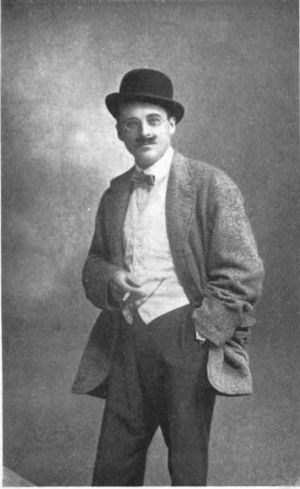Francis Yeats-Brown facts for kids
Quick facts for kids
Francis Yeats-Brown
|
|
|---|---|

Yeats-Brown as a "Hungarian Mechanic" in 1919
|
|
| Birth name | Francis Charles Claydon Yeats-Brown |
| Born | August 15, 1886 Genoa, Kingdom of Italy |
| Died | December 19, 1944 (aged 58) England |
| Allegiance | British Fascism |
| Unit | King's Royal Rifle Corps Royal Flying Corps Royal Air Force |
| Awards | DFC |
| Alma mater | Harrow School Royal Military Academy Sandhurst |
Francis Charles Claydon Yeats-Brown (born August 15, 1886 – died December 19, 1944) was a British army officer. He was also a famous writer. He is best known for his book, The Lives of a Bengal Lancer. This book won an award in 1930.
Yeats-Brown also had strong political views. His support for a political idea called Fascism caused him to lose his job as an editor in 1933.
Contents
Life and Adventures
Francis Yeats-Brown was born in Genoa, Italy, in 1886. His father was a British consul, which is like a diplomat. Francis went to good schools, Harrow and Sandhurst.
Time in India
When he was 20, Yeats-Brown went to India. He joined the King's Royal Rifle Corps. Later, he moved to the cavalry, which are soldiers who ride horses. He was sent to the North West Frontier. This was a challenging border area. Living there helped him understand the local Muslim people. Later in life, he supported the idea of an independent Pakistan.
World War I Experiences
During the First World War, Yeats-Brown fought in France and Mesopotamia. He was part of the Royal Flying Corps, flying planes. He showed great bravery and was given the DFC award.
In 1915, his plane was damaged during a mission. He became a prisoner of war for two years. His experiences as a prisoner became his first book, Caught by the Turks, published in 1919.
After the war, he briefly joined the Royal Air Force. He then returned to the Indian Army in 1919. He left the army in 1924. He then worked as an assistant editor for Spectator magazine. He left that job in 1928.
Famous Book and Later Views
The Lives of a Bengal Lancer was published in 1930. This book tells about his time in India from 1905 to 1914. It describes life in army towns, called cantonments. The book was very popular. It won the James Tait Black Award. It was even made into a successful movie in 1935, starring Gary Cooper.
In 1936, he wrote Lancer at Large. In this book, he showed interest in yoga.
During the 1930s, Yeats-Brown became involved in right-wing politics. He wrote articles that praised leaders like Francisco Franco and Hitler. He believed Hitler had solved Germany's unemployment problems. In 1937, Hitler told Yeats-Brown that The Lives of a Bengal Lancer was one of his favorite movies. Hitler even made it required viewing for members of the SS.
In 1933, Yeats-Brown became editor of Everyman. However, his strong support for Fascism surprised the directors. He had to resign from the job within weeks. His book Dogs of War, which supported going to war, did not sell well.
Second World War and Death
When the Second World War began in 1939, Yeats-Brown rejoined the army. In 1943 and 1944, he visited army camps in India and battlefields in Burma. He was gathering information for a new book called Martial India. He died in England in December 1944.
Books by Francis Yeats-Brown
- Caught by the Turks (1919)
- The Lives of a Bengal Lancer (1930)
- Golden Horn (1932)
- Dogs of War (1934)
- Lancer at Large (1936)
- Yoga Explained (1937)
- European Jungle (1939)
- Indian Pageant (1942)
- Martial India (1945)
Awards and Recognition
- October 10, 1919 – Francis Charles Claydon Yeats-Brown was awarded the Distinguished Flying Cross. This was for his excellent service during the war.
 | Calvin Brent |
 | Walter T. Bailey |
 | Martha Cassell Thompson |
 | Alberta Jeannette Cassell |

